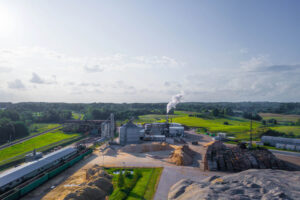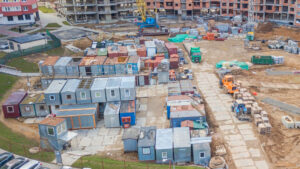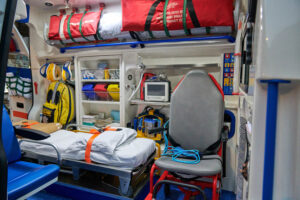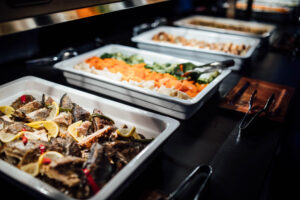
Explore Remote Camp Maintenance Jobs in Canada
Remote camp maintenance jobs in Canada support the full lifecycle of temporary worksites—from setup (mobilization) to daily operations (maintenance) and

Remote site catering in Canada comes with distinct logistical, environmental, and nutritional challenges. From Alberta’s oil sands to mining camps in the Yukon and infrastructure projects in British Columbia, feeding isolated workforces means more than just providing calories—it’s about supporting health, morale, and operational efficiency in extreme conditions.
Canada’s vast geography and harsh climates isolate many camps from traditional supply chains, often resulting in an overreliance on processed foods, bulk shipments, and single-use packaging—all of which contribute to food waste and environmental strain. As demand for responsible resource development grows, so does the need for sustainable catering solutions.
With increasing pressure from regulatory bodies and Indigenous communities, sustainability has become essential. Today, remote food catering services across Canada are adopting practices that reduce waste, conserve energy, and improve nutrition. From local sourcing and reduced food miles to eco-friendly packaging and adaptable menus, the industry is moving toward a greener, more resilient future—balancing environmental responsibility with the needs of a demanding workforce.
Canada’s remote industries—from resource extraction to environmental research—rely on well-organized catering operations to support workers in isolated and challenging environments. Camps in the far north, dense forests, and coastal regions face logistical hurdles such as limited refrigeration, weather-related delivery delays, high transport costs, and restricted access to fresh produce.
Traditional catering in these areas often depends on long-distance food transport, excessive packaging, and processed goods—practices that strain the environment. By adopting sustainable strategies, remote camp food catering services in Canada can lower their carbon footprint while delivering healthier, high-quality meals.
Success requires a proactive approach: smart meal planning, modern preservation technologies, and flexible camp food menu designs that adapt to shifting supply conditions. Solutions like local sourcing, eco-friendly waste management, and renewable energy for cooking are key to building a more sustainable, efficient remote site food catering model that supports both worker well-being and environmental stewardship.
Thoughtful meal planning ensures ingredient efficiency while accommodating seasonal variations across Canada’s diverse climates.
Partnering with Canadian farms and suppliers ensures fresher ingredients while supporting local economies.
Remote catering companies serving Canada’s isolated camps must implement strict food tracking and preservation techniques to prevent waste.
One of the biggest sustainability challenges in Canadian camp catering is excessive food portions and inefficient cooking methods.

Workers in remote sites often face long work hours and physically demanding conditions, making proper nutrition a priority.
Providing balanced meals rich in essential nutrients is critical for supporting the health and performance of camp residents.
Canadian workforces are diverse, and ensuring culturally inclusive meal planning improves satisfaction and morale.
Maintaining proper hydration is essential, particularly for workers exposed to extreme heat or cold.
Even with sustainable meal planning, food waste is inevitable. Implementing comprehensive waste management strategies helps mitigate environmental impact.
Remote site food catering operations in Canada can adopt composting systems for food scraps and biodegradable materials, converting waste into nutrient-rich soil that can support local plant growth or small-scale gardening at remote camps. Incorporating composting initiatives also reduces landfill dependency, helping remote sites align with Canada’s environmental conservation efforts.
Excess food can be donated to local communities or repurposed rather than discarded, benefiting Indigenous communities, shelters, and food security programs in isolated areas. Establishing partnerships with local food banks or donation networks ensures surplus meals are used efficiently, contributing to social responsibility efforts.
Utilizing compostable packaging reduces landfill waste and aligns with Canada’s sustainability goals, particularly in industries such as mining, forestry, and resource extraction that operate in ecologically sensitive regions. Switching to biodegradable food containers, reusable kitchenware, and eco-friendly serving materials further reduces the environmental footprint of remote site catering operations.
Sustainable meal planning in Canada’s remote camps is crucial for minimizing waste, enhancing nutrition, and maintaining environmental stewardship. By adopting responsible sourcing practices, optimizing portion control, and implementing effective waste management strategies, catering teams can significantly lower their ecological footprint while delivering nutritious meals to workers in isolated regions. Forward-thinking solutions such as composting, solar-powered cooking, and ethical procurement will enable remote food catering services across Canada to transition toward more sustainable operations. As industries prioritize environmental responsibility, catering providers must take active measures to integrate greener practices into their services.
Ultimately, embracing eco-friendly initiatives in food service helps conserve resources, lessen environmental impact, and improve overall efficiency. By committing to sustainable methods, remote site catering can redefine responsible and effective meal planning across Canada’s diverse and challenging landscapes.
Transform your camp’s food service with greener practices. Get in touch with our team to explore custom solutions.
Groupe Domco Canada Limitée est l'un des fournisseurs de services en régions éloignées le plus fiable et le plus respecté au Canada. Entièrement canadien et propriété indépendante, Domco est en affaires depuis 1945. Nous proposons des solutions intégrées pour les régions éloignées, notamment un cycle de menus nutritifs et bien planifiés, l'établissement de relations à long terme et de racines profondes canadiennes dans des endroits éloignés avec des communautés autochtones.
Laissez-nous vous présenter quelques avantages clés qui nous distinguent.

Remote camp maintenance jobs in Canada support the full lifecycle of temporary worksites—from setup (mobilization) to daily operations (maintenance) and

Remote catering companies play a vital role in supporting Canada’s vast and varied industries, especially those operating in isolated or

Oil and gas facilities management is a complex and critical discipline that ensures energy operations in Canada’s most remote locations

In the rugged, often isolated world of remote construction camps, construction facility management is the invisible force that sustains daily

Remote maintenance is the backbone of operational continuity in Canadian work camps, especially those located in isolated regions supporting industries

Remote camp health and safety is a vital concern in the management of Canadian remote workforce camps, especially in resource-driven

Keeping crews energized and satisfied starts with smart camp food menu ideas—especially in remote environments where morale and nutrition go

Gas remote camp mobilization is a critical operational phase in Canada’s oil and gas industry, particularly in remote and northern

When it comes to remote site security in Canadian work camps, ensuring safety and protection is paramount. These facilities, often

In Canada’s vast and resource-rich landscapes, remote site maintenance plays a pivotal role in sustaining the operations of work camps

In Canada’s vast and often isolated regions, remote camp management plays a vital role in advancing sustainability across diverse work

Remote site administration is a vital function in Canada’s most geographically isolated and operationally demanding environments. From the Arctic’s frozen

Developing a sustainable infrastructure for a remote camp facility located in the rugged, often isolated regions of Canada—such as the

In Canada’s vast and rugged landscapes, remote facility catering has evolved from a logistical challenge into a platform for sustainable

Budgeting for facility repair and maintenance in remote Canadian work sites is no small task. When miles away from urban
